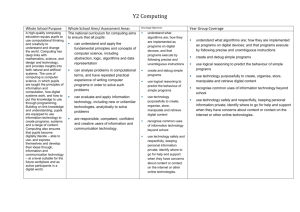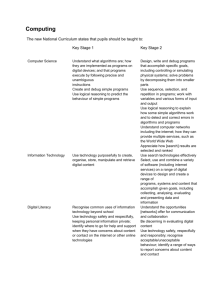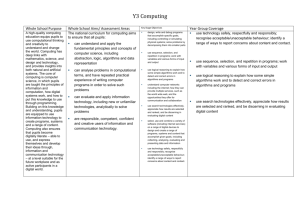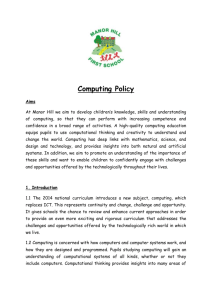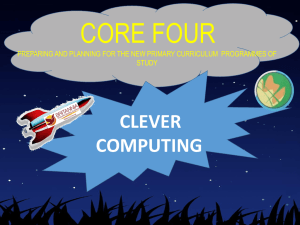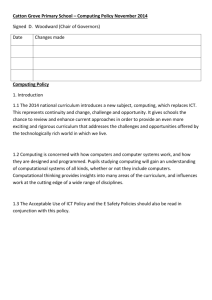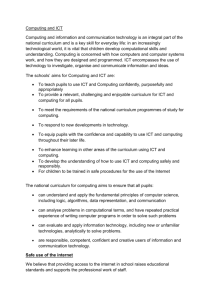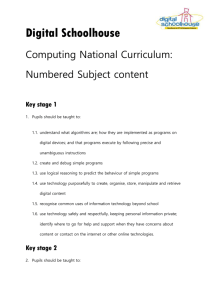Computing policy 2014
advertisement
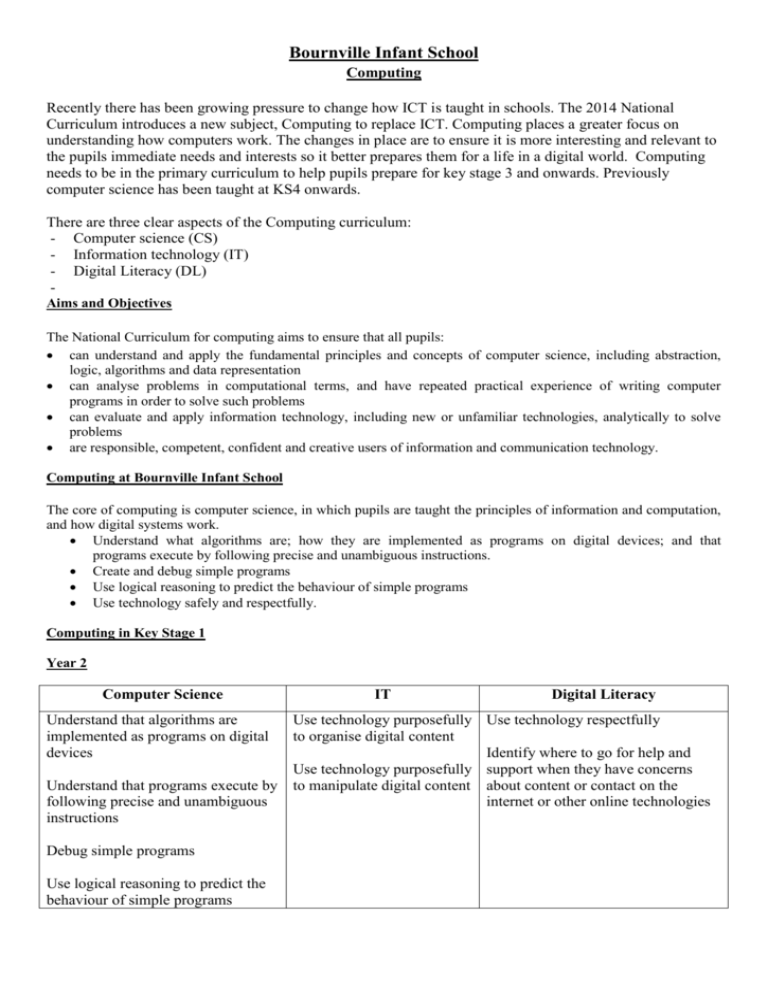
Bournville Infant School Computing Recently there has been growing pressure to change how ICT is taught in schools. The 2014 National Curriculum introduces a new subject, Computing to replace ICT. Computing places a greater focus on understanding how computers work. The changes in place are to ensure it is more interesting and relevant to the pupils immediate needs and interests so it better prepares them for a life in a digital world. Computing needs to be in the primary curriculum to help pupils prepare for key stage 3 and onwards. Previously computer science has been taught at KS4 onwards. There are three clear aspects of the Computing curriculum: - Computer science (CS) - Information technology (IT) - Digital Literacy (DL) Aims and Objectives The National Curriculum for computing aims to ensure that all pupils: can understand and apply the fundamental principles and concepts of computer science, including abstraction, logic, algorithms and data representation can analyse problems in computational terms, and have repeated practical experience of writing computer programs in order to solve such problems can evaluate and apply information technology, including new or unfamiliar technologies, analytically to solve problems are responsible, competent, confident and creative users of information and communication technology. Computing at Bournville Infant School The core of computing is computer science, in which pupils are taught the principles of information and computation, and how digital systems work. Understand what algorithms are; how they are implemented as programs on digital devices; and that programs execute by following precise and unambiguous instructions. Create and debug simple programs Use logical reasoning to predict the behaviour of simple programs Use technology safely and respectfully. Computing in Key Stage 1 Year 2 Computer Science Understand that algorithms are implemented as programs on digital devices IT Digital Literacy Use technology purposefully Use technology respectfully to organise digital content Identify where to go for help and Use technology purposefully support when they have concerns Understand that programs execute by to manipulate digital content about content or contact on the following precise and unambiguous internet or other online technologies instructions Debug simple programs Use logical reasoning to predict the behaviour of simple programs Year 1 Computer Science IT Understand what algorithms are Use technology purposefully to create digital content Create simple programs Digital Literacy Use technology safely Keep personal information private Use technology purposefully to store digital content Recognise common uses of information technology beyond school Use technology purposefully to retrieve digital content Computing in the Foundation Stage In the Foundation Stage Computing is an integral part of the curriculum where assessment is carried out against the Development Matters bands and Early Learning Goals from ‘Understanding the World.’ At 40-60 months children are expected to be able to complete a simple program on a computer. And use hardware to interact with age-appropriate computer software. By the end of Foundation Stage children are expected to: Early Learning Goal Recognise that a range of technology is used in places such as homes and schools. Be able to select and use technology for particular purposes. Work in the Foundation Stage and Key Stage 1 covers the appropriate curriculum requirements for Computing following an updated new scheme of work. The school is now using a new published scheme 'Switched on Computing' which addresses the above aims and objectives. Performance Teacher assessment in Computing is ongoing. In the Foundation Stage Computing is an integral part of the curriculum where assessment is carried out against the Development Matters bands and Early Learning Goals from ‘Understanding the World’. In Key Stage 1 the teachers will evaluate children’s attainment and progress using the skills passports. Attainment and progress in general terms is reported annually to parents. The subject leader is responsible for monitoring and evaluating the standards of children’s work and the quality of teaching and learning. The subject leader is also responsible for supporting colleagues and keeping them up to date with new and emerging technologies and development in the subject. Supported by the SLT the subject leader provides a strategic lead for the development and use of Computing in school. Management and Planning Computing will be allocated a sum of money annually from the school’s budget for the purchase of consumable materials and other resources. It will be monitored and evaluated as described above and also by the Head teacher during meetings with the leader. Revised by: Curriculum and standards committee (Autumn 2014) To be reviewed in: Autumn 2017 J.Kaur
